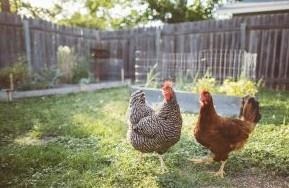More and more people are raising flocks of poultry in their urban backyards in Wisconsin and across the U.S. As the practice becomes legal in more areas and grows in popularity, experts recommend observing safe handling practices to avoid illness caused from poultry or eggs.
According to the Centers for Disease Control Prevention, 372 people were infected with Salmonella from backyard flocks in early 2017 alone, and more than one-third of those were children. Outbreaks of illness linked to backyard poultry have been reported across 47 states, and more are expected over the next several months.

Eggs
“Eggs are among the most nutritious foods on earth and can be part of a healthy diet,” says Barbara Ingham, food safety specialist with the University of Wisconsin-Extension. “However, they are perishable just like raw meat, poultry, and fish and even unbroken, clean, fresh shell eggs may contain harmful bacteria such as Salmonella.”
Scientists know that there are many ways bacteria can be introduced to eggs, such as through the laying process, contaminated poultry feed or bedding, or via baby chicks (pullets) that have been infected in a hatchery.
Fortunately, there are steps that you can take to help ensure safe, home-produced chicken eggs, says Ingham. She cites tested information from the fact sheet Egg Safety and the Backyard Flock written by Ingham and UW-Extension poultry specialist Ron Kean. The fact sheet is available online at https://foodsafety.wisc.edu/assets/pdf_Files/Egg_Safety_and_the_Backyard_Flock.pdf
Caring for the flock
A clean, well-maintained chicken shed will help to ensure safe eggs for your family. Ingham offers these tips.
- Maintain the flock in an enclosed shed to protect the flock from predators and make egg collecting easier.
- Keep the shed area clean and dry so eggs will stay cleaner. Thoroughly clean and disinfect the shed at least once a year with an approved disinfectant from your feed store. Apply according to directions.
- Allow one nest for every three to four chickens and make sure nests are large enough for your hens. To protect eggs, pad the nests with straw or wood chips. Clean out nest boxes once a week to remove dirty litter and manure and replace with clean nesting material.
- Allow adequate nest space and plenty of clean nesting material to help to ensure clean eggs and limit egg breakage.
- Provide a perch above the floor over a dropping box away from the nests. Chickens will roost on the perch to sleep and defecate into the wire-mesh covered dropping box. Do not let hens roost in the nest boxes.
- And to protect your family’s health, keep poultry feed and water dishes outside of the kitchen and away from household items.
Safe handling of eggs